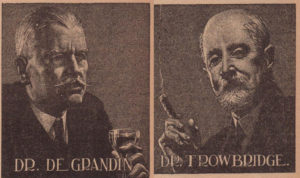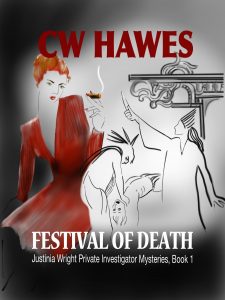The Chronicles of Barsetshire by Anthony Trollope was the first novel series in English.
Trollope had not intended writing a series, but after writing The Warden and Barchester Towers, he found himself returning again and again to the English county of Barsetshire that he had created. And thus, the novel series was born.
The Chronicles is a set of six loosely related novels all set in the imaginary county of Barsetshire. The novels can easily be read as standalones. However, they share a core set of characters, along with the town of Barchester and its environs. Over the course of the six novels, the various subplots eventually find a resolution and bring the series to a close.
In April of last year, I was at a virtual writers conference and learned of the multi-author book series. Immediately, I thought of Trollope and Barchester.
I proposed the idea of a multi-author series to my fellow Underground Authors, and nine of us were able to work the project into our schedules.
We then had to come up with a unifying factor, something that would hold the series together. After much discussion, and taking a cue from Trollope, we created the town of Magnolia Bluff, set in the beautiful Texas Hill Country.
Each of our books would be set in Magnolia Bluff. We’d have our own key characters as major players in our individual story, but we’d also make use of each other’s characters as we saw fit. And while each story would be as individual as the author who wrote it, the town of Magnolia Bluff would be there to hold together our diverse imaginations.
In effect, this was a riff on the approach we took with our short story anthology Beyond the Sea. There, each author used the same picture as inspiration for his or her story. And we got a dozen very different tales.
We hadn’t planned on crime also being a unifying factor. That just happened. We came up with stories that all involved murder, and thus, the Magnolia Bluff Crime Chronicles was born. (There’s a bit of a pun there, too, as the town’s newspaper is called the Chronicle.)
So how does a multi-author series work? Don’t things get messed up?
Well, they certainly could. But we derailed that problem by making sure we talked to each other so that we were all on the same page regarding geography and how we portrayed each other’s characters.
There has to be a spirit of community and cooperation, while at the same time maintaining our individual voices. Every step of the way we’ve hashed out issues and problems, coming to a consensus. It helps to have a project first attitude, as well.
Next week, I’ll talk about the first three books in the series; which are launching April, May, and June.
I have to say, if you like murder mysteries that have you scratching your head trying to solve the puzzle, and that keep you awake at night due to the suspense, as well as tickle your funny bone — then you were going to love these books.
Comments are always welcome. And until next time, happy reading!
 CW Hawes is a playwright, award-winning poet, and a fictioneer; as well as an armchair philosopher, political theorist, and social commentator. He loves a good cup of tea and agrees that everything’s better with pizza.
CW Hawes is a playwright, award-winning poet, and a fictioneer; as well as an armchair philosopher, political theorist, and social commentator. He loves a good cup of tea and agrees that everything’s better with pizza.


